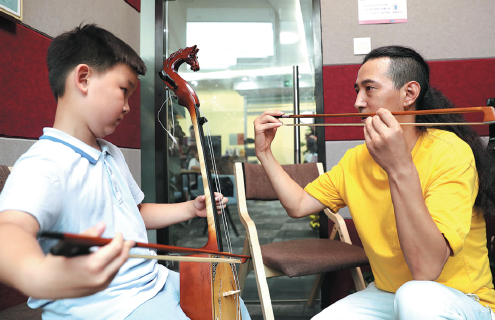Traditional instruments resonate in the modern age

Surleg shows 7-year-old Qiuqiu how to hold a morin khuur bow. ZOU HONG/CHINA DAILY
Music students attracted to the sounds of ancient China.
On a cool summer evening in 1991, the sun had just set and a leisurely breeze blew across scenic grasslands.
Herdsmen completed their day's work and gathered round an outdoor stage in Arvingerel, located in the east of the Inner Mongolia autonomous region.
They were awaiting the arrival of the Ulan Muqir, or Red Bud Troupe, in this small town situated amid the rolling Horqin Grasslands in Jalaid Banner, Hinggan League.
Ulan Muqir means "red bud" in Mongolian, and the art troupe travels from site to site, performing for herdsmen who live in some of China's remotest areas.
Surleg first watched an Ulan Muqir performance when he was 8. Impressed by the act, which included singing and dancing, he was intrigued by the sound of the morin khuur, a horse-headed fiddle that is a traditional instrument of the ethnic Mongolian group.
"When a young man dressed in ethnic clothing sat and started to play the morin khuur, I was quickly captivated by the deep and rough sounds he produced. I can't remember the pieces he performed, but I decided to learn to play the instrument," Surleg said.
He fulfilled his dream of mastering the instrument while he was in middle school, and in 2014, he traveled to Beijing to continue his music studies for two years. He now teaches morin khuur in the Chinese capital.
With the summer vacation arriving, he has a hectic schedule giving lessons to young students and adults.
One Sunday afternoon, he began a class with Qiuqiu, a 7-year-old boy, who had been learning the morin khuur for a few weeks.
He told his young pupil: "It sounds squeaky now, but it's OK.For beginners, it's not easy to produce a good sound, but you will be able to play some beautiful music once you've reached a certain level of proficiency. You just need to practice and not give up."
As he was being instructed, the boy tried to keep his bow moving in a straight line and maintain even pressure on the strings.
Vivid pictures
Qiuqiu's mother, who is from the ethnic Mongolian group, said: "The passionate sounds of the morin khuur evoke vivid images of life on the grasslands of Inner Mongolia. I want my son to learn the instrument, as it belongs to our ethnic group."
The two-stringed morin khuur features prominently in Mongolian nomadic culture. In 2003, it was recognized by the United Nations Educational, Scientific and Cultural Organization as an intangible cultural heritage. Six years later, morin khuur music was listed in the first group of national intangible heritage approved by the State Council, China's Cabinet.
Most of Surleg's students come from ethnic Mongolian families. There are also students, ranging from young adults to seniors, who have traveled to Inner Mongolia and been impressed by performances given by morin khuur instrumentalists.
"Although the instrument is learned by only a small number of people, I am happy to see that some schools in Beijing have included it as part of their art education," said Surleg, who teaches students at Yu Quan Primary School, which is affiliated to the Chinese Academy of Sciences. Since 2015, the school has offered morin khuur classes, and now more than 20 students, age 7 to 12, are being instructed by Surleg.
With music programs being offered at the vast majority of schools, students have access to a wide range of instruments.
Some of these, such as the morin khuur, are considered to appeal to minority tastes, but are attracting an increasing number of students to classes during the summer vacation.
On July 17, more than 60 people from across the country gathered at the Forbidden City Concert Hall in Beijing to attend two summer camps for instruction in the guqin (a seven-stringed zither), the xiao (a bamboo flute) and the xun (an egg-shaped wind instrument made from pottery clay).
As part of the ongoing annual Gateway to Arts 2021 Summer Festival, the two camps attracted students of all ages, with or without musical backgrounds.
Young students
One of Beijing's biggest arts events for children during the summer vacation since 1995, the Gateway to Arts Summer Festival opened this year at the Forbidden City Concert Hall on July 4 and runs until Aug 31.
The event includes 10 mini summer camps teaching children Western classical music, traditional Chinese operas and long-established Chinese instruments, along with 69 live performances and 10 public lectures.
Xu Jian, general manager of the concert hall, said it is the first time the festival has included instruction in the guqin, xiao and xun.
"We were worried whether these traditional instruments would be sufficiently popular to attract people. However, when applications opened, we were quickly relieved, as within 10 minutes all these courses had been booked," Xu said.
"It proves that more and more people appreciate traditional Chinese music. They want to try something new-yet old-in such instrumental music."
Guqin player Li Fengyun, a professor at the Tianjin Conservatory of Music, and musicologist Wang Jianxin, who is also a professor at the conservatory, are two leading teachers at the summer camps giving instruction on wind instruments such as the flute and xiao.
Li said, "We started by playing most classical pieces with our instruments, showcasing their beauty. These instruments are very old and are usually associated with images of people from ancient China in long robes writing poetry or practicing traditional Chinese ink painting, but we want to show how these instruments work against the backdrop of the contemporary world."
For absolute beginners, Li first designed courses to acquaint them with the guqin, which dates back thousands of years. The students then listened to the instrument being used to play various tunes at different tempos, before Li let them pluck it.
"The guqin is a very quiet instrument. A player needs to be patient and concentrate while playing it," she said.
Li added that she joined the Gateway to Arts festival last year and launched an online course in guqin instruction, which received warm feedback from students.
Gao Ge, a white-collar worker in Beijing, is one of the students taking Li's online classes. She started to learn the guqin five years ago, and after three days of instruction from Li, she made her stage debut at the Forbidden City Concert Hall.
"In my car, I listened to a CD that featured guqin pieces. I was instantly hooked by the sound, which I had never heard before. It made me feel calm and close to the music, although I didn't know the name of the piece," Gao said.
"After the guqin is mastered, it can help in many ways. I feel relaxed when I play it, and I am also reading Chinese poems and books about traditional Chinese culture."
Star performer
On July 16, renowned pipa recitalist Zhang Hongyan performed with her students at the Forbidden City Concert Hall, concluding the pipa summer camp led by Zhang.
A professor at the Central Conservatory of Music, Zhang played pieces adapted from popular Chinese songs, including Playing My Beloved Pipa, a popular number written by composer Lyu Qiming for the Chinese movie The Railway Guerrillas in 1956. Zhang also performed Guests From Afar Please Stay, a song written by Fan Yu and Mai Ding in 1953.
In 2011, Zhang launched a summer camp as part of the annual festival. Now in its tenth year, the camp attracts more than 120 students of all ages from around the country.
"I am very proud and happy to see that so many young Chinese love to play the pipa. I can see each one of them progressing," Zhang said.
She added that when the Forbidden City Concert Hall invited her to launch the pipa summer camp, it was the first such camp at the Gateway to Music festival dedicated to a traditional Chinese instrument. Before this, Western instruments, ballet and vocal training dominated the camp programs. In the first year, about 30 students joined the camp, with the number doubling the following year.
Zhang's students from the Central Conservatory of Music volunteer to join the camp to give instruction. This year, two classes were added for advanced pipa students.
Gan Shafei, 14, one of the students attending this year's pipa camp, first took part in the summer activity when she was 8 and was drawn to the four-stringed instrument, which has a history of some 2,000 years.
Now a student at the middle school affiliated to the Central Conservatory of Music, Gan plans to become a professional pipa player.
"I love playing the pipa, as it's a versatile instrument through which I can express my feelings about everything," she said.
Tang Dynasty (618-907) poet Bai Juyi described the sound of the pipa as "pearls landing on a jade plate".
Gan added: "That's just one of the sounds the pipa can produce. I'd like to play pieces for the instrument as much as possible and also try to compose one day."
On the final day of the pipa summer camp, Zhang invited a special guest onto the stage-Chen Jiayi, one of her students. The Beijing native, who is in her early 20s, has aplastic anemia, a rare bone marrow disorder, and has had to suspend her schooling.
Zhang said: "Of all my students, she is very special. She has been struggling with her illness, but it has not stopped her playing the pipa. I am her teacher, and at the same time, she inspires me. Her passion for the instrument empowers me."
Chen was not keen on playing the pipa when her father first suggested she study the instrument. She was about 10 at the time and had spent two years learning to play piano. Although she never expected to enjoy the pipa, she joined a traditional Chinese folk music troupe at her primary school and became one its best performers, later continuing her musical studies at summer camp.
When she was 14, Chen saw Zhang Hongyan performing on television, and quickly became a fan. She wrote to Zhang, and they became friends.
Chen said: "Whether I am happy or sad, I love playing the pipa. Since I suspended my schooling, I have studied at home alone. I am now reading books about musicology, music therapy and psychology.
"I try my best to play the instrument and I am still hoping that one day I can study at the Central Conservatory of Music, where Zhang teaches."



 Print
Print Mail
Mail





